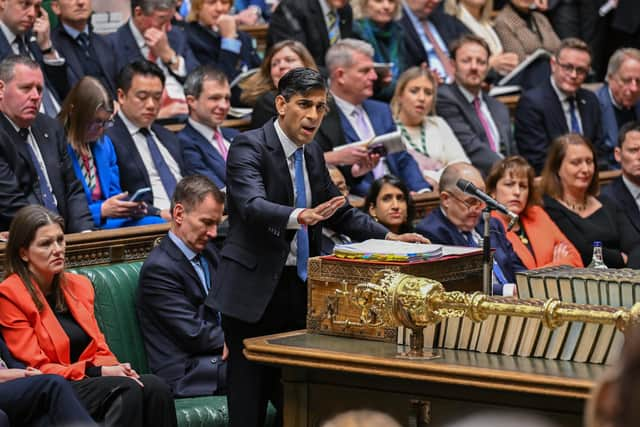Why I fear the next general election campaign could be the nastiest and most unpleasant in modern times - David Blunkett
As much as it pains me to say so, I fear that the run up to, and the UK election campaign, will be dominated by tax and immigration. Both have historically been toxic for the Labour Party, but now it is the Conservatives – substantially of their own making – who find themselves in an enormous mess over these issues.
These are not the only elephant traps which might derail what otherwise pundits believe to be a shoe-in for Keir Starmer later this year.
Advertisement
Hide AdAdvertisement
Hide AdTo begin with, governments have the power both to take measures they think will bring them back some popularity and also to put the opposition on the back foot. Tax is the obvious one. Not least, because there will be a budget on March 6 and should Rishi Sunak and Jeremy Hunt decide to go for a grossly irresponsible cut in the basic rate of income tax, or a superficially attractive gesture on inheritance tax, Labour would have to respond with a clear narrative.


Ten days ago Rishi Sunak appeared to rule out an early election, although his phraseology still leaves open the possibility of proroguing Parliament on March 20 and holding both the national and local elections on May 2. Readers may recall that in 2017 the Conservatives did extremely well in the local elections but a few weeks later lost their overall parliamentary majority. The Prime Minister must be banking on the opposite scenario with a poor showing in the local elections and with, as yet, unidentified rabbits appearing out of hats as the year wears on to boost Tory morale. History teaches us that no one should take for granted, not least in our current febrile political environment that today’s opinion polling will remain as favourable to the opposition. Not least because this could be the nastiest and most unpleasant election campaign in modern times. That is why Keir Starmer’s New Year commitment to Project Hope, was so important.
But in addition to Labour's clear policy on tackling climate change and moving to net zero (which has its own political dangers), having a rational debate about the critical importance of public services must surely be elevated to a moral imperative?
After all, the health service is literally falling apart. The £19bn of public expenditure cuts built into Jeremy Hunt's autumn statement impacted on all services other than defence and, somewhat debatably, investment in schools. The education budget will, by this summer, have returned to the level of real terms spending that existed in 2010, but the projected cuts will affect all other parts of the education service, including further education and investment in skills.
Advertisement
Hide AdAdvertisement
Hide AdBradford-born Barbara Castle, who was a renowned politician in the last half of the 20th century, used to talk about the importance of the “social wage". What she meant was that a great deal of public expenditure is actually a way of helping those on middle and low incomes. Except for those who can buy their way out of deteriorating services and the long-term impact on themselves and their children, carefully targeted and properly managed public expenditure is a crucial part of a civilised society and a prerequisite for economic prosperity and growth.
Labour must surely be arguing the case well in advance of a general election.
What's more – and I'm sure that Rachel Reeves, as Shadow Chancellor, understands this very well – unless Labour is absolutely clear about how far it is prepared to accept further damaging reductions in tax and therefore even bigger cuts in public expenditure well in advance of the March budget, the Party will be all over the place.
Drawing a line, now, in terms of what is, or is not, acceptable, and arguing it publicly, may seem dangerous, but it's better than allowing the Conservatives to set the agenda and, therefore, the terms on which the general election will be fought.
Advertisement
Hide AdAdvertisement
Hide AdThere are substantial alternative policies which don't cost a lot of money.
One such initiative would be to put the opposition on the side of the consumer. It might be going a bit far to say that we are living in “rip-off Britain", but the way the privatised utilities are run, and the eye watering profits of both the banks and the insurance, oil and gas industries must surely be elevated to front and centre?
Here in Yorkshire, we don't like to be taken for a ride. Empowering local government to re-establish Consumer Protection Departments and backing this up from central government, would put Labour firmly on the side of the people.
Just one more thought on the road to competence, stability and, yes, decency. Listen a little more to the voices of those who live outside London. It takes more than pollsters to understand how people are feeling and thinking.
David Blunkett is a Labour Party politician, and served as the MP for Sheffield Brightside and Hillsborough.
Comment Guidelines
National World encourages reader discussion on our stories. User feedback, insights and back-and-forth exchanges add a rich layer of context to reporting. Please review our Community Guidelines before commenting.